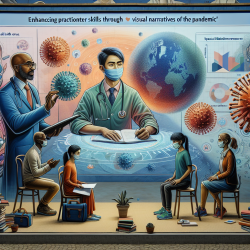Introduction
In the complex landscape of healthcare, practitioners frequently encounter ethical dilemmas that challenge their moral responsibilities. A recent research article, "Vulnerability, Moral Responsibility, and Moral Obligations: The Case of Industrial Action in the Medical and Allied Professions," offers valuable insights into these challenges. This blog explores how practitioners can enhance their skills by understanding and implementing the outcomes of this research.
Understanding Vulnerability and Moral Responsibility
The research highlights the vulnerability of patients during industrial actions, such as strikes by healthcare professionals. Vulnerability, defined as susceptibility to harm, places patients in a precarious position when healthcare services are withheld. Practitioners must recognize that their moral agency entails a duty to protect these vulnerable individuals, even when engaging in industrial actions.
Key Takeaways for Practitioners
- Recognize Vulnerability: Practitioners should be aware of the inherent vulnerability of patients and the moral obligations that arise from it. This awareness can guide decision-making processes during industrial actions.
- Balance Rights and Responsibilities: While practitioners have the right to strike, they must balance this with their moral responsibility to patients. The research suggests that vulnerability leads to moral obligations that should be prioritized.
- Collaborative Responsibility: The study emphasizes the collective responsibility of both healthcare professionals and governments to prevent harm to patients. Practitioners should advocate for systemic changes that protect patient welfare while addressing their own needs.
- Engage in Ethical Reflection: Practitioners are encouraged to engage in continuous ethical reflection, considering the implications of their actions on vulnerable patients. This reflection can enhance their moral agency and decision-making skills.
Encouraging Further Research
The research paper serves as a starting point for practitioners interested in exploring the ethical dimensions of healthcare. By delving deeper into the theories of moral responsibility and vulnerability, practitioners can better understand their roles as moral agents. Further research can also provide insights into developing strategies that balance the rights of healthcare workers with the needs of patients.
Conclusion
Practitioners in the healthcare field play a crucial role in safeguarding the welfare of vulnerable patients. By understanding the moral responsibilities highlighted in the research, they can enhance their skills and contribute to a more ethical healthcare environment. To read the original research paper, please follow this link: Vulnerability, Moral responsibility, and Moral Obligations: the case of Industrial Action in the Medical and Allied Professions.










